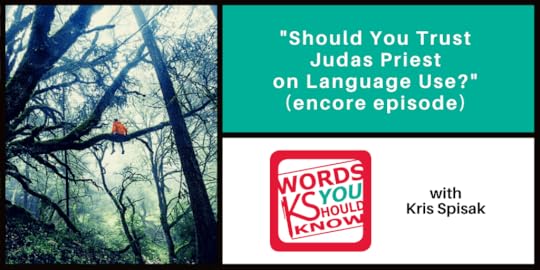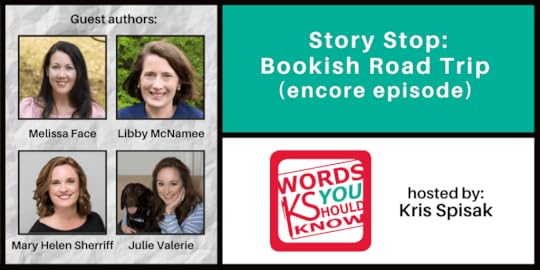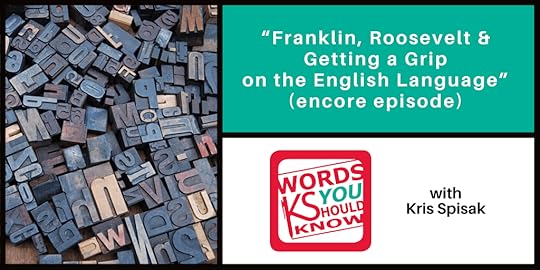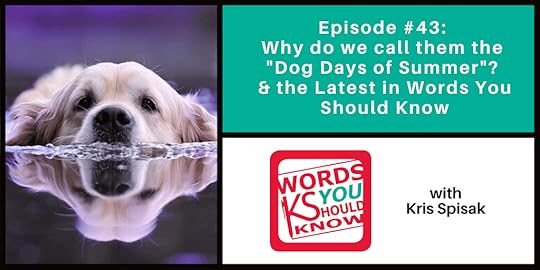Kris Spisak's Blog, page 4
July 20, 2021
Writing Tip 429: “First Come, First Serve” or “First Come, First Served”?
 Taking care of your customers isn’t a new idea, and this is an expression with nearly three-hundred years of history. But what is the expression? Is it “first come, first serve” or “first come, first served”?
Taking care of your customers isn’t a new idea, and this is an expression with nearly three-hundred years of history. But what is the expression? Is it “first come, first serve” or “first come, first served”?
Restauranteur, small business owner, or otherwise, it’s time to get this phrase right.
The correct expression is “First come, first served,” as in “the first to arrive will be the first to have service provided.”There’s a line at the deli counter, and orders are being taken in an organized fashion. Customer service has a long list of callers, and each will be answered in the sequence in which they came in. It’s not the squeaky wheel (or loudest voice) who gets the attention, but the one that showed up or reached out first. Good system? Absolutely.
But systems are only as powerful as the language used to explain them. At least that’s my argument.
Of course, spelling and grammar aren’t always everyone’s strong suits. Here’s a historical overuse of this expression’s correct and incorrect use:
(Remember, just because you see it written down—on the internet or elsewhere—that doesn’t mean that the grammar of what you’re looking at is correct.)
So, there’s your answer. When it comes to the question of “First Come, First Serve” or “First Come, First Served,” the answer should include the “d.”
But a new question lingers…
How do you punctuate “first come, first served”?Comma? No comma? Hyphens? Oh my!
As you’ve noticed in my write-up here, there should be a comma between the two parts of this phrase: “first come, first served.”
Should there be hyphens? Usually not. However, if this phrase is being used as an adjective phrase—as in “orders are handled on a first-come, first-served basis” (“first-come, first-served” acting as an adjective for the noun “basis” in this case)—they should be put to use.
Do you have remaining use questions about “first come, first serve” or “first come, first served”? If so, let me know. If not, good luck with your wait times and happy writing, folks!
Sign up for my monthly writing and editing tips and trivia email newsletter for more language answers like this.
The post Writing Tip 429: “First Come, First Serve” or “First Come, First Served”? appeared first on Kris Spisak.
July 13, 2021
Should You Trust Judas Priest on Language Use? (encore episode)
A few stolen minutes out of your day to talk words and communication, because our daily lives are surrounded by the evolution and influence of words. Forget the grammar police. There is so much more to this conversation.

Apple Podcasts | Android | Spotify | Amazon Music | YouTube
Welcome to the summer series of the Words You Should Know podcast, where no, I’m not going to go into the etymology of summer, dog days, or solstice (been there, done that). But, instead, we’ll revisit “Story Stop Tour” events of earlier this year and popular episodes you may have missed from years past. This will be a seven episode break, with new episodes resuming on Wednesday, September 22nd, 2021.
So welcome to the encore of Episode 4: “Should You Trust Judas Priest on Language Use? (“Another Think Coming” or “Another Thing Coming”?) originally released October 3, 2018. Enjoy the show!
For the approximate transcript of the full episode:See Episode #4 of the Words You Should Know podcast.
Sign up for my English language tips and trivia email newsletter for more articles and podcasts like this.
If you like what you’ve been hearing, don’t forget to subscribe to this podcast (via Apple Podcasts, Spotify, Android, Google Podcasts, Stitcher, or RSS) so you’ll never miss out on another word you should know. Many thanks to those of you who have taken the time to rate my show wherever you listen.
Words. Language. Communications. We’ve got this.
The post Should You Trust Judas Priest on Language Use? (encore episode) appeared first on Kris Spisak.
July 7, 2021
Writing Tip 428: “Insight” vs. “Incite”
 A great insight might lead to a great inciting of the people, a call-to-action led by a great epiphany. The question of “insight” vs. “incite” isn’t always a matter of confusion, but it is often a matter of paying attention (and knowing which syllable to stress). And great insights come from paying attention, no? Inciting great things can happen in the same way.
A great insight might lead to a great inciting of the people, a call-to-action led by a great epiphany. The question of “insight” vs. “incite” isn’t always a matter of confusion, but it is often a matter of paying attention (and knowing which syllable to stress). And great insights come from paying attention, no? Inciting great things can happen in the same way.
Easy enough? Maybe.
Remember:
“Insight” (stress the first syllable) is a noun, meaning a greater understanding of something. If someone is “insightful” (the adjective form), they might be wise, sagacious, or show a deeper comprehension of something—like you after you’ve read a good language tips blog, right?“Incite” (stress the second syllable) is a verb, meaning to stir up, motivate, or call into action. Often it is used in terms of “inciting an insurrection” or “inciting violence,” but any major momentum can work with this verb. It doesn’t have to be something negative. Inciting world peace? Why not?Do “insight” and “incite” sound quite similar? Indeed they do, yet their distinct spellings are important to understand.
“Insight” has been a part of the English language since the 1200s, and “incite” entered English in the 1400s. Word cousins of “insight” include the obvious ones, such as “sight,” “hindsight,” and “foresight” to name a few, all of which seem to come from the Old High German word siht. Close relations of “incite” are “excite,” “recite,” and “citation”—all having the same Middle French root of citare, meaning “to put into motion.”
But then more questions follow…
What is the plural of the noun “insight”? Or is there a plural form?Oh no… oh yes… another language debate is upon us.
Some argue that “insight” is not a countable noun. Even if one has many ideas, these sources say, you could still include these many ideas within a new insight (singular). Or you might be a person of great insight, which makes you complex but the word itself remains singular. Thus, these sources contend that “insight” works for all purposes.
Others claim that because one could count different revelations on one’s fingers, one after the other, that there should indeed be the plural form “insights.”
Countable or uncountable? What do you think?
I argue both can work in a plural situation. The English language can be fluid, and this is one more example of that fluidity.
“Insight” vs. “Incite”? In conclusion…Not so far off from “flair” vs “flare,” “immolate” vs “emulate,” “inflamed” vs. “enflamed,” and “lighted vs. “lit,” there’s a certain level of heat when we talk about the differences between “incite” and “insight.” But be safe with matches and fiery language, folks. Good luck with those insights, and may you incite greatness in all you pursue.
You’ve got this.
Sign up for my monthly writing and editing tips and trivia email newsletter for more language answers like this.
The post Writing Tip 428: “Insight” vs. “Incite” appeared first on Kris Spisak.
June 29, 2021
Story Stop: Bookish Road Trip (encore episode)
A few stolen minutes out of your day to talk words and communication, because our daily lives are surrounded by the evolution and influence of words. Forget the grammar police. There is so much more to this conversation.

Apple Podcasts | Android | Spotify | Amazon Music | YouTube
Welcome to the summer series of the Words You Should Know podcast, where no, I’m not going to go into the etymology of summer, dog days, or solstice (been there, done that). But, instead, we’ll revisit “Story Stop Tour” events of earlier this year and popular episodes you may have missed from years past. This will be a seven episode break, with new episodes resuming on Wednesday, September 22nd, 2021.
What are my Story Stops? Imagine a program where you take a pause in your life to consider the stories that have shaped you into who you are. That’s what my third book, The Family Story Workbook, is all about, and at my Story Stop Tour events, I’ve been honored to hear the stories of talented authors, poets, and wordsmiths as they dive into their memories and invite you to dive into yours. You can learn more about these events at StoryStopTour.com.
This is the encore of Story Stop: Bookish Road Trip, originally held on February 11, 2021, and now replayed for you here on the “Words You Should Know” podcast. Enjoy the show!
The live video from the event can be found below via YouTube, as well as from the original broadcast on Facebook Live and Twitter.Event Summary:
“Story Stop: Bookish Road Trip” will bring you behind the scenes into the lives of authors Melissa Face, , Mary Helen Sheriff, and Julie Valerie, founders of the “Bookish Road Trip” Facebook Group. Everyone has stories to tell, and capturing them can be not only a special effort but a profound personal or family project. Maybe after listening in, you’ll feel called to capture the stories of your own.Sign up for my English language tips and trivia email newsletter for more articles and podcasts like this.
If you like what you’ve been hearing, don’t forget to subscribe to this podcast (via Apple Podcasts, Spotify, Android, Google Podcasts, Stitcher, or RSS) so you’ll never miss out on another word you should know. Many thanks to those of you who have taken the time to rate my show wherever you listen.
Words. Language. Communications. We’ve got this.
The post Story Stop: Bookish Road Trip (encore episode) appeared first on Kris Spisak.
June 22, 2021
Writing Tip 427: “Vs” / “Vs.” / “V.” (How to punctuate the abbreviation of “versus”)
 And sometimes the competition is simply you vs. yourself. (Ooh, did I just give away my home stomping grounds with this sentence?)
And sometimes the competition is simply you vs. yourself. (Ooh, did I just give away my home stomping grounds with this sentence?)Who has the theme song from Rocky in their head? Me? Maybe. Or maybe you’re thinking about the dual-tone sound effects of Law & Order.
Wherever your mind may go with this question—as long as we’re not thinking about “verses” from Shakespeare or Tupac Shakur, which are a part of another conversation—these are the details you need to know.
How do you punctuate the abbreviation of “versus”?Well, like so many things, it depends on where in the world you are when you’re asking the question.
American English likes our punctuation. Period. (See what I did there?)
British English is more subtle. Much like in the punctuation standards of titles ahead of a name (e.g., “Mr” or “Ms” or “Dr”), British English does not always use the period after the abbreviation. In fact, they commonly skip it, especially when the final letter(s) of the abbreviation match the final letter(s) of the full word.
Thus, in the U.S., you’ll find Phillies vs. Nats or perhaps Man v. Backyard Squirrel, and in the U.K., you’ll find Violet Beauregarde vs Veruca Salt, as examples.
Of course, if my introduction of “v.” makes you pause, yes, it is often pronounced as “vee,” and it is most commonly used in U.S. legal disputes, as in:
Brown v. The Board of EducationRoe v. WadeThe State of Tennessee v. John Thomas ScopesInterestingly, the earliest English language record of the word “versus” comes from a legal document back in 1447. Did you know there were legal cases this far back in history? Of course there were. John Husset versus John Notte might not have set a legal precedent that lingers into the present day; however, it does set a linguistic precedent.
(And I can’t end the subject of this old legal case without noting its introduction, which captures the language and spelling of the day: “Also the jugement by twene … John Husset versus John Notte.” Did you catch that? “The jugement by twene”? The judgement between. Words evolve (as do we all), and digging into these transformations is fascinating, no?)
By 1873, the use of “versus” had shifted out of the legal realm. For example, the philosopher Herbert Spencer wrote of “The old battle-ground of free will versus necessity.” When this shift occurred exactly, I haven’t yet been able to put my finger on, but stay tuned.
The versatility of versus and its punctuation may not make you inclined to write verses, but knowing how to punctuate the abbreviation of “versus”—or should we say “abbreviations,” plural?—is helpful indeed. (And yes, both “versatile” and “versus” do stem from a common Latin root, while “verses” comes from a different Latin direction.)
Happy writing, folks.
Sign up for my monthly writing and editing tips and trivia email newsletter for more language answers like this.
The post Writing Tip 427: “Vs” / “Vs.” / “V.” (How to punctuate the abbreviation of “versus”) appeared first on Kris Spisak.
June 15, 2021
“Franklin, Roosevelt & Getting a Grip on the English Language” (encore episode)
A few stolen minutes out of your day to talk words and communication, because our daily lives are surrounded by the evolution and influence of words. Forget the grammar police. There is so much more to this conversation.

Welcome to the summer series of the Words You Should Know podcast, where no, I’m not going to go into the etymology of summer, dog days, or solstice (been there, done that). But, instead, we’ll revisit “Story Stop Tour” events of earlier this year and popular episodes you may have missed from years past. This will be a seven episode break, with new episodes resuming on Wednesday, September 22nd, 2021.
So welcome to the encore of Episode 3: “Franklin, Roosevelt & Getting a Grip on the English Language,” originally released September 29, 2018. Enjoy the show!
For the approximate transcript of the full episode:See Episode #3 of the Words You Should Know podcast.
Sign up for my English language tips and trivia email newsletter for more articles and podcasts like this.
If you like what you’ve been hearing, don’t forget to subscribe to this podcast (via Apple Podcasts, Spotify, Android, Google Podcasts, Stitcher, or RSS) so you’ll never miss out on another word you should know. Many thanks to those of you who have taken the time to rate my show wherever you listen.
Words. Language. Communications. We’ve got this.
The post “Franklin, Roosevelt & Getting a Grip on the English Language” (encore episode) appeared first on Kris Spisak.
June 9, 2021
Writing Tip 426: How do you spell “ice cream sundae/sunday”?
 But here’s another important question, what makes an ice cream sundae? Is it the syrup? The nuts? Whipped cream? The cherry? Is this a debate anyone can truly win?
But here’s another important question, what makes an ice cream sundae? Is it the syrup? The nuts? Whipped cream? The cherry? Is this a debate anyone can truly win?How do you spell “ice cream sundae/sunday”? Well, that question has an answer. As to the origins of this dessert, that’s a bit more tricky. Or should I say sticky?
I scream; you scream. We all scream for ice cream.
But what about that sunday? Or wait… what’s wrong with this question?
Not that you’re one to go around correcting menus with white-out and sharpies (no, seriously, not cool… even if this typo is all over the place!), but here’s the answer you’re looking for:
The correct spelling is “ice cream sundae.”Yes, it is likely related to a day of the week, but it should not be spelled that way (anymore).
An “ice cream Sunday” might be a lovely Sunday (as in the day of the week) when one gets a special ice cream treat, but it’s not the name of that treat. An “ice cream sundae,” on the other hand is an ice cream with some sort of topping, often chocolate sauce, nuts, whipped cream and/or a cherry.
So problem solved? Not quite.
There’s an intense debate over the origin of the ice cream sundae and even the origin of its name.
The playful or perhaps not so playful dispute continues to cause some frigidity between Two Rivers, Wisconsin and Ithaca, New York over who can rightfully claim the sundae’s invention. Others vying for it also include Evanston, Illinois and Norfolk, Virginia, yet the common thread in most of these stories seems to be the idea that, like alcohol, sodas were often banned on Sundays in the late 1800s in America. These “Sunday” laws, also called “blue laws,” were in respect of the sabbath, and thus made it impossible in some locations to have an “ice cream soda,” a popular treat of the time, on Sundays. So, skipping the soda, someone had the idea of putting the syrup usually added to soda directly on top of the ice cream, the ice cream Sunday was born. Probably. Possibly.
Wait! Did you just catch my spelling? Yes, it was commonly called an “ice cream Sunday” in its early days, but it seems that out of respect for the church and the solemnity of Sundays, the spelling was changed to “sundae” to avoid any potential disrespect or offense.
Is all of the above the 100% true story? Maybe. Maybe not. You noticed my high degree of “seems” and “probably” statements in this summary. There’s likely some truth hiding in there, but the specifics aren’t facts I can guarantee (no matter what Ithaca and Three Rivers residents want to say).
Now, if we want to dig into it (as some determined high school students did in 2007–awesome, right?), the first documented ice cream sundae in the United States seems to come from Ithaca. An ad in the Ithaca Daily Journal on October 5, 1892 highlights the new specialty. Yet, we all know the birth of language (and desserts) isn’t always documented on paper immediately, so who knows?
Yes, the question of why an ice cream sundae is called an “ice cream sundae” is still up for debate, as is the exact invention of the dessert. However, one thing we do know for sure. It’s an “ice cream sundae,” folks, not an “ice cream Sunday.”
For the love of summertime, let’s at least get this part right. Should I say pretty please with a cherry on top? Yeah, I’ll go with that.
Sign up for my monthly writing and editing tips and trivia email newsletter for more language answers like this.
The post Writing Tip 426: How do you spell “ice cream sundae/sunday”? appeared first on Kris Spisak.
June 2, 2021
#43 – Why do we call them the “Dog Days of Summer”? & the Latest in Words You Should Know
A few stolen minutes out of your day to talk words and communication, because our daily lives are surrounded by the evolution and influence of words. Forget the grammar police. There is so much more to this conversation.

Welcome to episode number 43, where we’ll talk about the specific dog connected with the “dog days of summer” or the specific mythological dog, or… well, we’ll get there. Is a summer vacation on your mind? Well, no matter your answer, today’s episode can take you there.
But first, here’s…
The Latest in Word, Language & Writing NewsToday, we’re not going into brain science, animal science, or technology, but we’re revisiting the niche of discovered words. Specifically, have you heard that:
A grad student at Oxford University doing archival research in the Yale Beinecke Library of Rare Books and Manuscripts in New Haven uncovered long lost poetry of William Carlos Williams written on old prescription pads that the poet used for notes and collecting his ideas. William Carlos Williams is the modernist poet of the red wheelbarrow if that’s helpful for you in placing him. Just imagine coming across this find!A similar reemergence of some other poets is worth mentioning as well. When you think of the late Middle Ages, you might think of religious works being the major force in the literary world; however, a team of academics has recently revived the names and influence of early Italian vernacular poets, as in poets using the language of everyday, common speech of the time, on the artists of the later Renaissance. And all of this comes from references about a long lost manuscript that was a treasure passed between the Italian nobility of the 1400s and 1500s. Their letters, as well as partial copies and excerpts of the original manuscript, which was lost sometime in the 16th century, brought the importance of little known poets to the forefront, including contemporaries of Dante, the author of The Divine Comedy, which is largely considered one of the greatest literary works in Italian history (and side note: not written in the everyday, common speech you’d hear on the street of Dante’s neighborhood). But Dante was not on an island, and getting to know his poetic peers is fascinating, no?In other medieval manuscript news, there’s also a breaking story of a wife swap captured in the illustrations in one illuminated manuscript, where a husband literally painted over a depiction of his first wife, who had died, to personalize a book for his second wife, (seriously? Yep. I mean, dude, come on!) But I suppose this news story is starting to stray out of the topic of language and into the artistic. But thank you, modern infrared technology. More links, as always, are in my show notes.But let’s get to the heart of today’s episode, or maybe I should say the heat of it.
English Language History & TriviaIt may not quite be summer while I’m recording this, but it’s definitely starting to feel very close. At least here in Virginia. And this brings to mind a common phrase that you might not know the true origin of.
“The dog days of summer.”What comes to mind? A tired, hot doggo, resting its snoot on its paws? Or tongue panting, too exhausted to do anything because of the heat?
Right. So many of our minds go there, but if this is where you think the “dog days” came from, you might have another think coming.
The “dog days” of summer are ancient, long before the invention of ice cubes for your lemonade or sprinklers you could play in.
This expression actually refers to Canis Major, a canine constellation. Sirius, the star also nicknamed “the dog star” and famous for being the brightest star in the sky, is Canis Major’s nose, and this star and its connected constellation rise in the sky with very specific position starting in late July in the northern hemisphere, just as the heat of the summer intensifies to its peak. Canis Major was known as Orion the hunter’s dog, and in the sky, not only is he with Orion, but he also seems to be chasing another constellation, Lupis, a hare.
As far back as the writing of the epic poem, The Iliad, Sirius is referred to as Orion’s dog, and this star is an omen of heat of many kinds, including anger and violence.
There’s an ancient scientific theory that because the dog star, Sirius, appears rise in the sky just before the sun at this time of year, its proximity to the sun allowed its own brightness to intensify the heat of the day. Of course, as we now know, that’s just not how seasonal heat works. But the name stuck nonetheless.
“The Dog Days” after that darn dog star that heats things up.
The dog days were translated from Latin into English about five hundred years ago, and it’s been an expression that’s had some saying power, even if we don’t always make the correct connections with it.
So that’s what “the dog days of summer” refers to, though all the panting dogs out there certainly feel it too. I hear you.
And since we’re talking summertime and stars, did you know that the word “Solstice” comes from “sol” (for sun) and “stit-,” for standing still. Because it’s at the summer and winter solstice that sunrise and sunsets almost seem to freeze in time for a few days, getting barely earlier or later, depending on the season, reaching the peak, then going in the opposite direction. The sun standing still. Well almost. Scientific precision isn’t always captured in language, but the evolution of scientific thought sometimes is. And how cool is that?
In Latin, it was solstitium. Middle English speakers made their tweaks, and thus, we’ve had “solstice” since the 1200s.
All this talk about Latin, is it revving you up for an awesome summer? Okay, maybe not. But whether you have man’s best friend or not, here’s hoping the dog days treat you well.
Language ChallengeNow if you need a break from all this summertime talk, let’s talk ice for today’s language challenge.
Think about the chilly Arctic, icebergs, snow, glaciers, and specifically ice floes. An iceberg, as you know is much like a mountain, but an ice floe is a flat piece of ice floating along in the chilly water. But how do you spell “ice floe”? Think you’ve got it?
The answers, as always, can be found on my website, at GetAGripOnYourGrammar.com.
Personal Update:This episode’s personal update is more of an update about the show than my own work. This will be our last episode for a couple of months as we’ll be taking a much needed summer break, but the Words You Should Know podcast won’t just be going away. I’ve planned a summer series of popular older episodes that will be revived as encores as well as showcases of past “Story Stop Tour” events of recent months, so I’ll have plenty to keep sharing until new episodes resume in September.
You take care, folks, and as I’m shaping our next new episodes, definitely let me know what you like, what you’re interested in, what you’re not interested in, so I can make sure to continue this podcast in a way you’ll enjoy.
Take care, folks. May your words treat you well!
Sign up for my English language tips and trivia email newsletter for more articles and podcasts like this.
If you like what you’ve been hearing, don’t forget to subscribe to this podcast (via Apple Podcasts, Spotify, Android, Google Podcasts, Stitcher, or RSS) so you’ll never miss out on another word you should know. Many thanks to those of you who have taken the time to rate my show wherever you listen.
Words. Language. Communications. We’ve got this.
The post #43 – Why do we call them the “Dog Days of Summer”? & the Latest in Words You Should Know appeared first on Kris Spisak.
May 26, 2021
Writing Tip 425: How do you spell “look-see” / “looksy” / “looksie”?
 When empowering your communications, you want to avoid redundancies, but this is one word that is built on exactly that.
When empowering your communications, you want to avoid redundancies, but this is one word that is built on exactly that.Let’s have a look-see/looksy/looksie into the correct spelling of “look-see,” shall we not? (Yes, I know. There was no way to write this sentence without giving it away.)
Though you might see all of these spellings, only one is correct.
The correct spelling is “look-see.”Did you get it right?
Not so different from saying “hear hear,” when exclaiming support for an idea being spoken, reminding others to listen up (yes, that “hear hear” is spelled H-E-A-R twice), “look-see” has a similar repetitiveness.
As for taking a look-see, it means to take a brief look at something.
“Look-see” isn’t cute babytalk or a diminutive form implying a “little look,” as might be suggested with spellings such as “looksy” or “looksie.” Rather, this word is a combination of the verbs “to look” and “to see,” which are near synonyms. While its origins in the 1860s likely stem from a pidgin English formation, it somehow stuck in the everyday vernacular, lingering for roughly one hundred fifty years so far. That’s some informal English with staying power.
But, that being said, that staying power doesn’t always include correct spelling. “Looksy” is never considered right. “Looksie” is sometimes accepted (I’m looking at you Microsoft Word), but I don’t know if that’s coming from confusion with the word “lookie-loo” or otherwise.
“Look-see” isn’t a word to use in formal academic or business writing, but there’s nothing wrong with employing just the right word on other occasions. The English language is full of possibilities for just that, right? That’s the beauty (and perhaps the agony) of our language that has derived from so many varied sources. So many words have evolved from a singular moment where a term underwent a transformation that stuck. Here’s simply another case.
Do you have a different word where you’d like to take another “look-see”? Contact me today to share your questions or suggestions about a future word tip.
Sign up for my monthly writing and editing tips and trivia email newsletter for more language answers like this.
The post Writing Tip 425: How do you spell “look-see” / “looksy” / “looksie”? appeared first on Kris Spisak.
May 18, 2021
#42 – Crime & Virtue in “Strolls” & “Saunters” – Plus the Latest in Words You Should Know
A few stolen minutes out of your day to talk words and communication, because our daily lives are surrounded by the evolution and influence of words. Forget the grammar police. There is so much more to this conversation.
[image error]
Episode #42 – Crime & Virtue in “Strolls” & “Saunters” – Plus the Latest in Words You Should KnowApproximate transcript:Welcome to episode number 42, where we’ll saunter, stroll, and meander through our conversation about hikes and walking. You never realized how sometimes holy and sometimes criminal these simple acts can be—well, at least etymologically. And we’ll maybe get into what punctuation you may be according to your zodiac sign. Seriously? Maybe not, but articles like that always make me smile and lead to further questions. You know you’re curious.
But first, here’s…
The Latest in Word, Language & Writing NewsCommunications news can mean so many things, from animal communications to writing with artificial intelligence, but today, our updates take us into the world of brain technology—no, not hacking into fruit fly brains like we discussed a few episodes ago—specifically, communications not shared via one’s mouth or a traditional writing instrument. Recent studies have been examining how one can communicate merely by thinking.
Now the study that first caught my attention on this note lately was focused on a paralyzed patient, and how scientists were able to transfer his ideas into written words by having this patient think about not only what he wanted to share but to think about hand writing his ideas letter by letter. We’ve seen the past studies about how sometimes we learn better when we hand-write notes versus just listening. Now, this study seems to be tapping into a similar science, activating the part of the brain used when hand writing ideas, letter by letter, word by word to activate the brain in a particular way that creates sharable writing. Now how often during these Words You Should Know podcasts do I say a news story is mind-blowing. But this is another one of those cases.
The article that first caught my attention on the subject is titled “Man Who Is Paralyzed Communicates By Imagining Handwriting,” and a link to it is in my show notes, of course. As are a couple others on the subject from Scientific American and Nature.com if you’re interested.
In a similar brain science communications update, another study has recently been published focused on typing purely with one’s thoughts—well, one’s thoughts and a microchip implanted in one’s brain. And I know I love examining the merging of communications and futurist technology, but this one’s a bit much even for me—at least at this stage of the technology. I know some of us dictate texts or emails or speeches or books into our phones, but dictation through thought? Or perhaps “dictation” isn’t even the right word. What will that new word be? Now, this typing-by-thought-process sounds messy and a bit too much of a stream of consciousness ramble, but who knows? I imagine there’s great power here too. And I can only imagine the editorial tools of the future.
But we’re not in that future quite yet. Today, we’re talking a walk through the present. A walk, a stroll, a saunter. There are so many words for traveling by foot from here to there. However, some of these words have fascinating stories to them in themselves, and I’m not talking about “go” hijacking its past tense from another word. We’ve already covered that way back in episode 2.
Let’s turn to today’s…
English Language History & TriviaSpecifically the history of these walking words.
“Saunter” is a fascinating word, not only for its playful casualness, but because its meaning of “walking slowly, without any hurry, in a relaxed manner” has not always been its definition.
It seems that “saunter” came from an earlier Middle English form, santren, meaning “to muse” or “to reflect” or “daydream.” So, if you want to take a thoughtful walk, perhaps you might saunter, but here’s where I’m going to bring Henry David Thoreau into the mix—no, not because we’re going to talk about sauntering around Waldon Pond, but because he seems to be the origin of a fake etymology story about the word “saunter.”
Perhaps you’ve seen the social media meme, quoting famed writer and environmentalist John Muir, where he explains that one should not “hike” in the woods but “saunter.” As the quote goes:
“Way back in the Middle Ages, people used to go on pilgrimages to the Holy Land, and when people in the villages through which they passed asked where they were going, they would reply, ‘A la sainte terre,’ ‘To the Holy Land.’ And so they became known as sainte-terre-ers or saunterers. Now these mountains are our Holy Land, and we ought to saunter through them reverently, not ‘hike’ through them.”
Personally, I love this idea, and there is so much holy to be found in nature; however, sorry John Muir, but this isn’t a true story. If this John Muir reflection, as cited from Sierra Club sources, through another’s recollection, is true at all.
Henry David Thoreau, in his essay “Walking,” cites a similar but slightly tweaked story, specifically:
“Some, however, would derive the word from “sans terre,” without land or a home, which, therefore, in the good sense, will mean, having no particular home, but equally home everywhere. For this is the secret of successful sauntering.”
The third related but questionable claim is that “sauntering” comes from the Anglo-French word sauntrer the from French word, s’aventurer, “to take risks.”
But the Oxford English Dictionary among many others nix this theory as false as well. So take it as a lesson, social media memes aren’t always true, as you know, but even wise writers one might respect are known to take wrong turns—and we’re keeping this conversation just on language discussions. I know there’s a bigger conversation to be had about wrong choices and so many of the quote-unquote greats.
So there’s no relation to “sauntering” and the Holy Lands or those without a home and thus a home everwhere, but there is a solid connection between “sauntering” and “reflecting,” and that’s something to seize upon.
But “sauntering” isn’t the only “walk-like” word to go through a transformation. “Stroll” is another.
Now, maybe you think of “stroll” as similar to “saunter.” To “stroll” is to take a casual walk. You can push a stroller with babies inside as you go for a stroll. How sweet and innocent is that? Except for the fact that it actually isn’t at all.
The word “stroll” likely comes from a Swiss German word, strolchen, meaning not just “to walk about,” but also “to loaf,” coming from a related word for “vagabond,” “vagrant,” or “travelling fortuneteller.” Now this seems to come from an Italian word, astrologo, meaning “astrologer.”
Astrologer. Stroll. You can see the connection. But in this way, those who historically strolled were considered troublemakers and con-artists. Now, cross-cultural and class judgements aside—ooh, look another big conversation that could come out of this—“stroll” has come a long way, hasn’t it? Will this make you rethink pushing a “stoller” with innocent babies inside? Would you rather call it a “buggy” or “pram” to avoid the confusion? That’s up to you, but I think you’re solid in modern usage.
There are so many great stories and etymology tales hiding in walking words.
“Meander” comes from the Greek name of an ancient river in Asia Minor, present day Turkey, which has a winding course.“Hike” seems to come from the Middle English word hytchen, which also gives us the word “hitch,” so in some ways, you could say “hike hike” instead of “hitch hike.” Maybe. I’ve seen it theorized. Some of these theories crack me up, but there you go.And lastly, “walk” came into English in the 1200s, a mix up of two different words, specifically the Old English word wealcan, meaning to toss or journey about, and the Old English word wealcian to roll up or muffle up. How walk walked from these meanings to its present day definition is a language stroll for another day.And if we’re side notes, I probably should mention that if you were walk, stroll, or saunter through Paris, we could give a little shout-out to our conversation about “gargoyles” a couple of episodes back. The Notre Dame cathedral in Paris now has a fundraising campaign for renovations including the ability for one to adopt their stone “grotesques,” as in the figures many call “gargoyles” but without the drainage spouts through their throats and mouths.
There’s so much to ponder on a walk, right?
But moving on to our…
Language ChallengeI quoted words attributed to John Muir and Henry David Thoreau today (and yes the hyperlinks to the references, as always, are included in my show notes); however when you are speaking about a quote, what is the proper way to do so. Is it “quote/unquote” or “quote/end quote”? There’s a debate here, and there’s also a correct answer.
“Quote/unquote” or “quote/end quote”?
The answers, as always, can be found on my website, at GetAGripOnYourGrammar.com.
Personal Update:As for my personal update, honestly I’m in the waiting stage that is so ever-present in a writer’s life. Books are being pitched. New projects are in their pre-tadpole stage, not yet metamorphosing into what they will be. And this is where I stumble upon this article titled “Written in the stars: Your punctuation mark based on your zodiac sign.” Am I a big believer in horoscopes and zodiac signs? Not really, but I’m easily distracted sometimes in pre-tadpole stage planning and waiting mode.
So, I’m a Libra, and to quote from this article, “natural mediators, you like to keep everything nice and balanced… Like a hyphen, you make things connected, increase readability and maintain symmetry — just as a Libra should.” So not a dash, but a hyphen (oh there is a difference, and the Leo’s out there get the em dash). What’s an em dash? Wait, there are types of dashes? Oh yeah there are. These are the details the editors of the world geek out on.
I’m not sure how I’m feeling about my hyphen, but I think it’s working for me. The history of disappearing hyphens is coming to mind, though, so is this an added prediction? Yikes.
Now I’m totally being playful with this, because sometimes we need to embrace a little space for that in our lives, don’t we? And if you’re interested in your sign’s punctuation, I have the link saved for you. Don’t you worry.
I didn’t hear the request directly from your brain, whether you’re imagining the letters of your message or otherwise, but in this moment of waiting—I can’t help but share.
I’m curious about your reaction.
Sign up for my English language tips and trivia email newsletter for more articles and podcasts like this.
If you like what you’ve been hearing, don’t forget to subscribe to this podcast (via Apple Podcasts, Spotify, Android, Google Podcasts, Stitcher, or RSS) so you’ll never miss out on another word you should know. Many thanks to those of you who have taken the time to rate my show wherever you listen.
Words. Language. Communications. We’ve got this.
The post #42 – Crime & Virtue in “Strolls” & “Saunters” – Plus the Latest in Words You Should Know appeared first on Kris Spisak.



